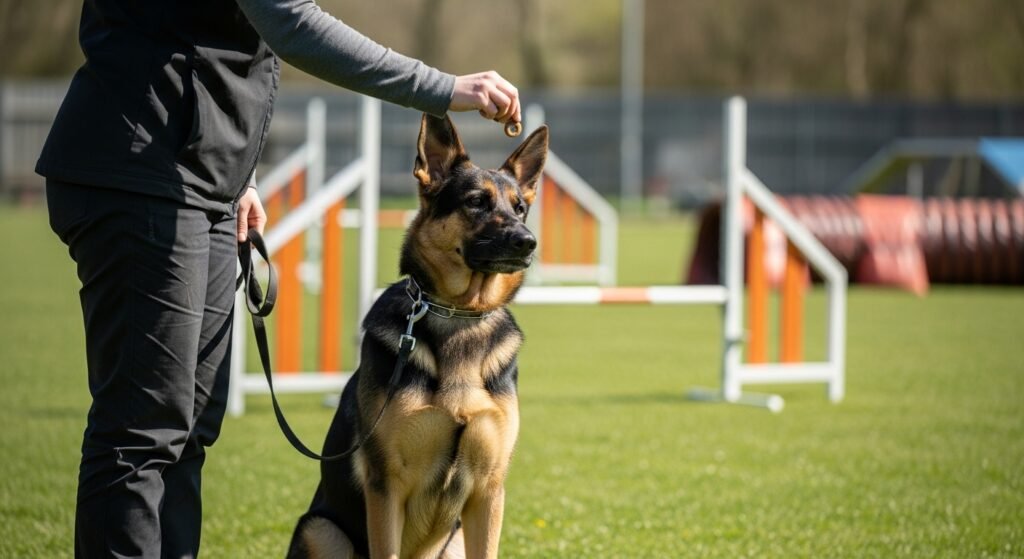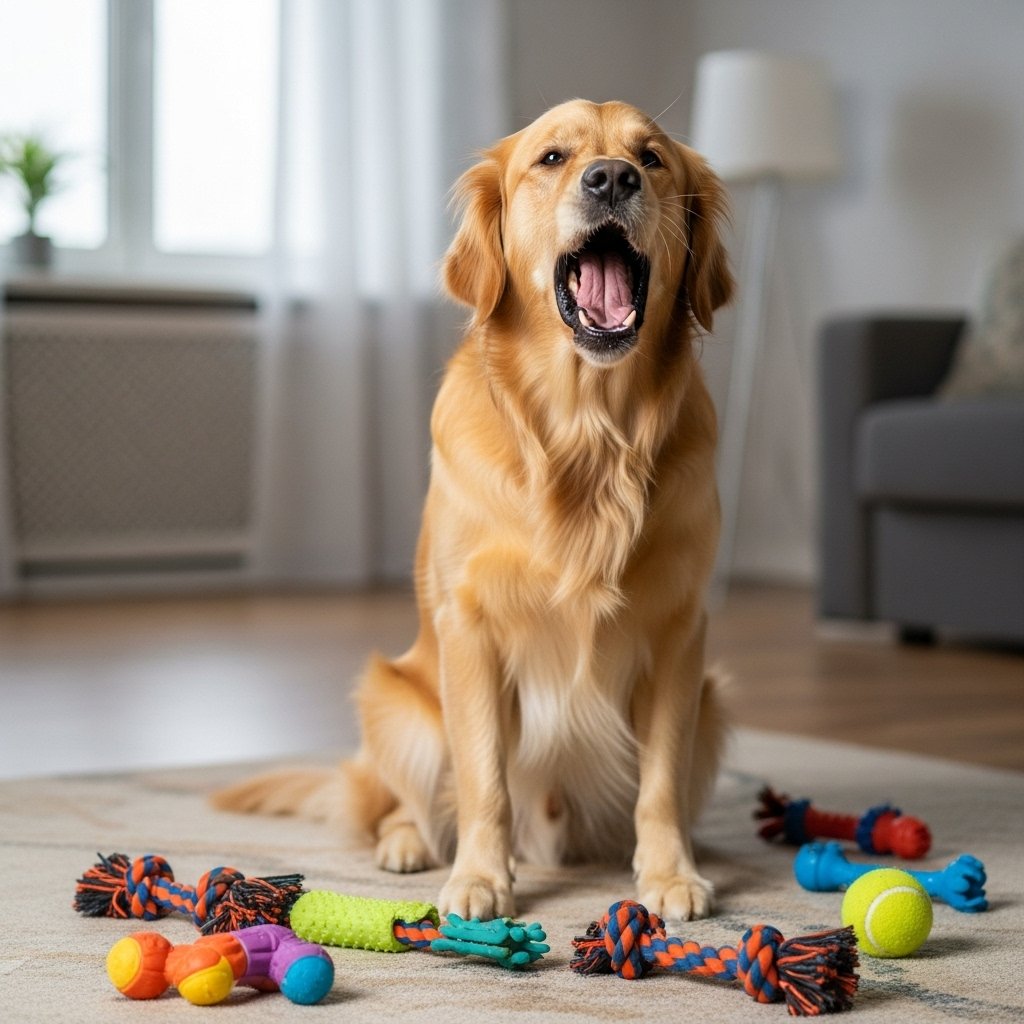
Why Does My Dog Bark at Nothing? (Causes & Solutions)
You’re sitting on the couch, enjoying a quiet evening, when suddenly your dog jumps up and starts barking at… nothing. No intruder, no mailman, no obvious reason. Just endless barking at the wall, corner, or open air.
If this sounds familiar, you’re not alone. Many dog parents experience the mystery of “ghost barking.” The truth is, dogs rarely bark at nothing. Their senses, emotions, or environment usually provide a reason even if we can’t see it.
This guide breaks down why dogs bark at “nothing” and what you can do to help.
Common Reasons Dogs Bark at Nothing
- Heightened Senses (They Hear or Smell Something You Can’t)
Dogs’ senses are far more advanced than ours:
- Hearing: Dogs can hear frequencies up to 65,000 Hz (humans only up to ~20,000 Hz). They may bark at distant sirens, wildlife outside, or tiny house noises.
- Smell: With 220 million scent receptors, they might detect a stray animal nearby, even if invisible to us.
So when your dog barks at a corner, they may be reacting to subtle sounds or scents we simply miss.
- Boredom & Excess Energy
Dogs left without enough mental or physical stimulation often bark for self-entertainment. It’s their way of saying:
- “I need something to do!”
- “Pay attention to me!”
This is especially true for high-energy breeds (Border Collies, Huskies, German Shepherds).
- Anxiety or Stress
Dogs with separation anxiety or general nervousness often bark excessively sometimes at “nothing” visible. Triggers include:
- Being left alone
- Loud noises (fireworks, storms)
- New environments
In these cases, barking is a coping mechanism.
- Territorial Instincts
Dogs are naturally protective. Even if you don’t see a threat, your pup may sense someone walking by the house, another dog nearby, or subtle vibrations outside. Barking is their way of guarding their turf.
- Attention-Seeking
Smart dogs quickly learn: barking gets a reaction. Whether it’s you talking, scolding, or feeding them, they may bark at “nothing” just to get you involved.
- Aging & Cognitive Dysfunction
Senior dogs sometimes develop canine cognitive dysfunction (CCD), similar to dementia in humans. Symptoms include:
- Night time barking
- Staring at walls or corners
- Pacing or confusion
In this case, “barking at nothing” may be a sign of disorientation.
- Medical Issues
Sometimes barking indicates discomfort or pain, especially if sudden and unusual. Dogs may bark more if suffering from:
- Hearing or vision loss (reacting to shadows or faint noises)
- Neurological issues
- Physical pain
If barking is new and unexplained, a vet check is essential.

How to Tell Why Your Dog Is Barking
Look for context clues:
- Time of day: Night barking often = anxiety or sensory reaction.
- Body language: Stiff posture and alert ears = territorial; relaxed but playful = boredom.
- Environment: Is there wildlife outside? Neighbors moving? House creaks?
- Age: Older dogs may bark due to confusion.
Observation is key to identifying the root cause.
Solutions: How to Stop Your Dog From Barking at Nothing
- Rule Out Medical Issues
Schedule a vet check to ensure excessive barking isn’t caused by pain, sensory loss, or neurological issues.
- Increase Exercise & Mental Stimulation
A tired dog is a quiet dog. Try:
- Daily walks or runs
- Fetch or tug-of-war
- Puzzle feeders and snuffle mats
- Training sessions (sit, stay, new tricks)
Even 15 minutes of training can mentally exhaust your dog.
- Desensitize to Triggers
If your dog barks at outside noises:
- Close blinds or curtains
- Play white noise or calming music
- Reward calm behavior when triggers occur

- Manage Anxiety
For anxious dogs:
- Use calming aids (pheromone diffusers, Thunder Shirts, CBD chews with vet guidance)
- Establish predictable routines
- Slowly practice alone-time training to reduce separation anxiety
- Avoid Reinforcing Attention Barking
Don’t respond immediately to barking. Instead:
- Wait for silence before rewarding or giving attention
- Teach a “quiet” command with treats
- Reward calm behavior consistently
- Provide a Safe Space
Give your dog a comfortable retreat like a crate, bed, or quiet room so they feel secure without needing to bark.
- Training Techniques
- “Speak & Quiet”: Teach barking on command, then reward silence.
- Redirect Behavior: Give a toy, chew, or command when barking starts.
- Positive Reinforcement: Never punish barking instead, reward desired quiet behavior.
Mistakes Dog Owners Make
- Yelling at your dog – They interpret it as “barking with you.”
- Inconsistency – Sometimes rewarding barking, sometimes punishing it confuses them.
- Ignoring underlying issues – Pain or anxiety-driven barking won’t go away with simple training.
- Lack of stimulation – A bored dog will always find a way to entertain themselves.

Final Thoughts
When your dog “barks at nothing,” they’re actually reacting to something even if invisible to you. Whether it’s sharp senses, boredom, anxiety, or medical issues, barking is communication.
The key is to observe, identify triggers, and respond with patience and training. With the right balance of exercise, enrichment, and reassurance, you can turn ghost barking into peaceful quiet.
Remember: barking isn’t bad it’s natural. The goal isn’t to stop your dog from ever barking, but to help them bark less, with purpose, and live a calmer, happier life.
Ready to Connect?
Enjoyed learning about big dog breeds? Join the Pets Fun Zone community — a growing space for U.S. pet lovers to:
Share photos, stories, and experiences
Ask questions and get advice
Discover recs for food, training, vet care, and more
Join us today at Pets Fun Zone and be part of a caring community of passionate dog lovers!
Let’s welcome all the gentle giants together.



